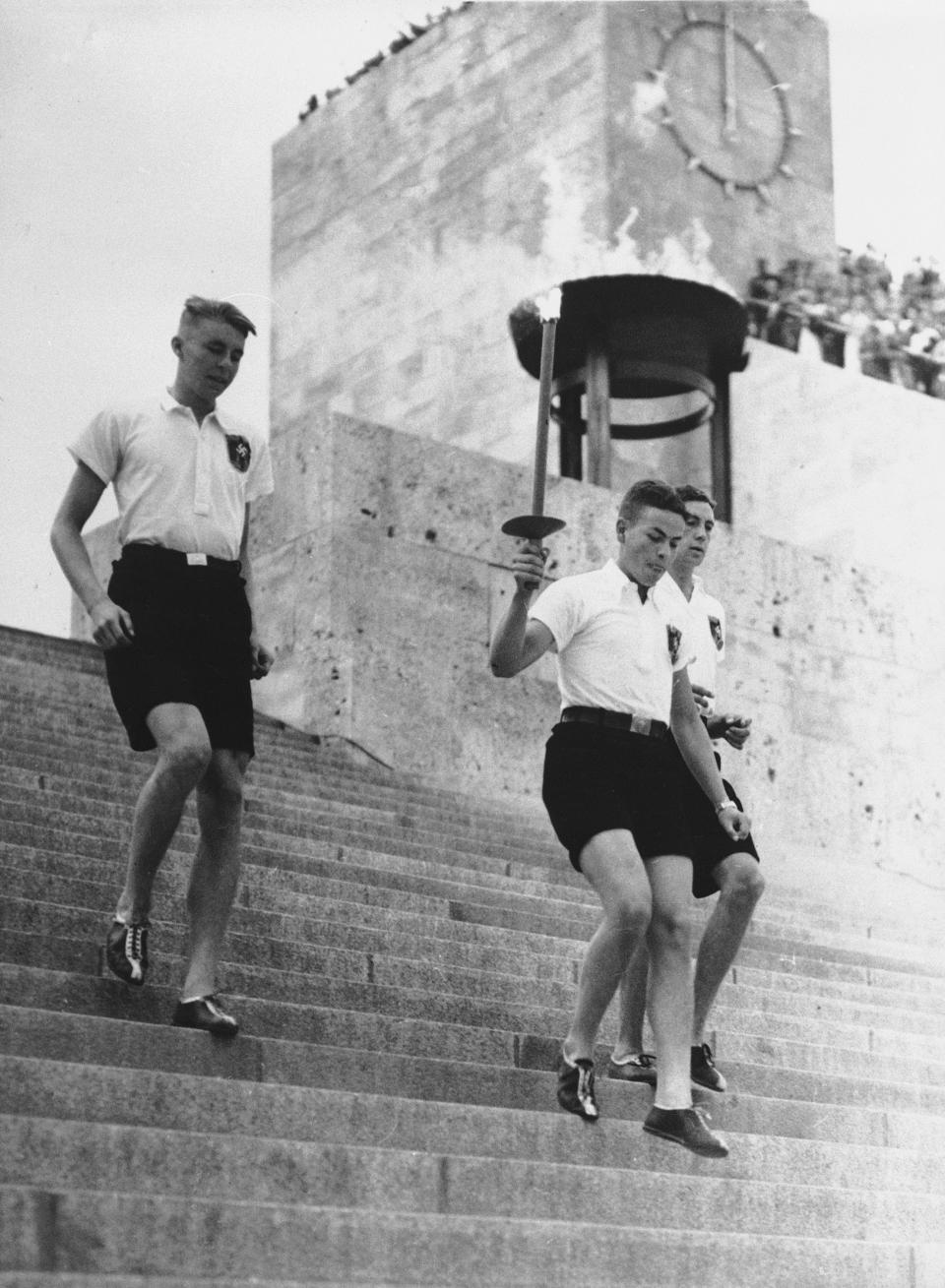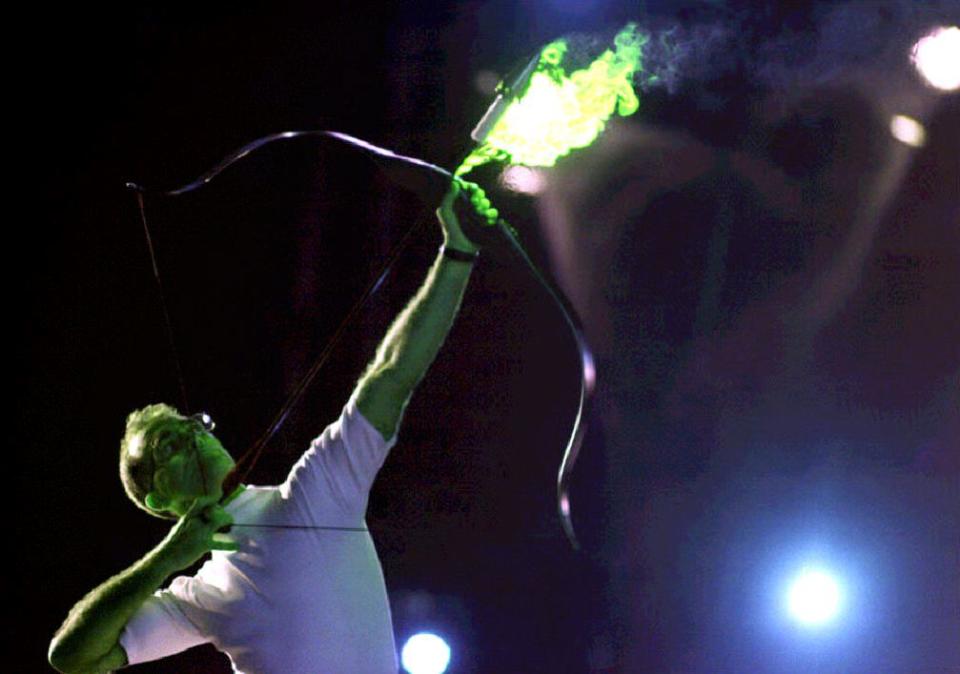Top five torch lighting moments from Olympic opening ceremonies
They have become rather garish, extravagant occasions, the Opening Ceremony of the Olympic Games. They had always been sizable celebrations, replete with no small amount of grandeur, though the 2008 Olympic Games in Beijing outdid them all, with more than 15,000 performers and a price tag that ballooned into nine digits.
Each dazzling display is, of course, closed with the initial seminal moment of each Games: the lighting of the Olympic torch. Sometimes it’s an archer firing a blazing arrow. Sometimes it’s a retired boxer. Sometimes it involves James Bond and a speedboat and a queen “skydiving” into the ceremony.
Invariably, it is something to behold, and it’s always kept a surprise (unless a photographer catches a glimpse of it and reports it to the world). You can find out who will light this year’s cauldron live right here on Feb. 9 at 6 a.m. ET.
In the meantime, here are our top five — a purely subjective measurement — Olympic torch lighting moments.

5. Germany, 1936
Controversial, yes, but it’s included here because it was the first.
Lighting a torch to initiate the Games began with the original Olympics in ancient Greece, which commemorated Prometheus stealing fire from Zeus.
But the idea of a relay, of transporting the torch from one Olympic site to the next via torch bearers, is a relatively modern concept, beginning in Berlin in 1936.
Siegfried Eifrig — good trivia name to know — was the first to light the torch in such a fashion, and though it wasn’t extravagant or flashy or brilliant, it was the first.
Many contend the relay was a propaganda effort on the part of the Nazis. But it stuck as a tradition to this day.

4. Tokyo, 1964
Tantamount to Eifrig being the first to light the cauldron via relay style, Tokyo in 1964 is also on this list more for its momentous circumstance than the glitzy fashion in which the torch was set ablaze.
The final torchbearer was a 19-year-old named Yohinori Sakai. He was born on Aug. 6, 1945, the day the Americans dropped a nuclear bomb on Hiroshima. Tokyo marked the first Asian city to ever host an Olympic Games, and for a teenager, who was born on one of the most devastating days in Japanese history, to light the final torch to initiate the first Asian-hosted Games was a monumentally symbolic gesture.

Li Ning did a lap around the top of the Bird’s Nest to light the Olympic torch in Beijing in 2008. (Getty)
3. Beijing, 2008
Beijing is almost unanimously considered to be one of the greatest opening ceremony spectacles of any Games. It certainly was going to be closed in a manner befitting the previous three hours of spectacular drumming, dancing and somewhat psychedelic effects.
Gymnast Li Ning was the last runner to take the torch — and up, up, up he went. For almost 35 seconds, Ning was pulled up via wires to the top of the Bird’s Nest, when he began to “run” on air, doing a full lap to the cauldron with a spotlight following his movements.
It took Ning a little less than four minutes to complete the lap, putting one final, wild touch on an indelible Opening Ceremony.

2. Barcelona, 1992
Antonio Rebollo was stricken with polio when he was eight months old. It affected, mainly, his legs, and in particular his right leg. But it didn’t keep him from becoming a paralympic archer for Spain, and it didn’t keep him from being one of 200 potential archers to put an incredible finishing touch on the Barcelona Opening Ceremony, where rather than simply light the torch via hand, an archer would fire a flaming arrow to initiate the Games.
The field of 200 was narrowed down to four, and then, simply, to one: Rebollo would be the man to fire the arrow and light the Olympic flame.
Truth be told, for safety reasons, Rebollo fired the arrow into a sandbox set up outside the stadium. The cauldron was simply lit up as the arrow passed it by, though few, if anybody, noticed at the time, and it did nothing to diminish the effect of a remarkable end to a ceremony.

1. Atlanta, 1996
It was the great surprise of the 1996 Olympic Games: Who would light the Olympic flame? It had been a surprise enough that Atlanta had been awarded the Games at all, what with Toronto and Athens being the presumptive favorites. And it was a surprise enough that, for the first time in modern Olympic history, all 196 invited nations had accepted and sent athletes to compete. The 85,000 packed into the Centennial Olympic Stadium, along with millions of viewers around the world, watched with rapt attention as the legendary boxer Evander Holyfield passed the Olympic torch to four-time gold medalist swimmer Janet Evans. For a brief moment it was quiet, or as quiet as a stadium of 85,000 can be, as Evans reached the top of the platform.
And then the stadium rose with a collective roar as Muhammad Ali, the self-proclaimed greatest, the final torch bearer for the 1996 Atlanta Games, walked up the platform and touched his torch to Evans’.
As United States President Bill Clinton applauded, Ali, shaking, his body battling the inexorable spread of Parkinson’s Disease, raised his torch to the crowd. He held it for a moment, soaking in the Olympic stage he hadn’t experienced since 1960, when his lightning-fast fists earned him a gold medal in Rome. The crowd loved it, growing louder and louder, until Ali lit a wick that fired upwards and eventually ignited the cauldron.
The 1996 Olympic Games had finally begun.
More Olympic coverage from Yahoo Sports:
• 10 things you didn’t know about Lindsay Vonn
• Drone-catching drones to be used as security tactic
• The joint Korean women’s hockey team is coached by … a 29-year-old Minnesotan?
• The 1 Winter Olympic sport U.S. has never medaled in
• Top five American stars to break out in 2018 Winter Olympic Games

